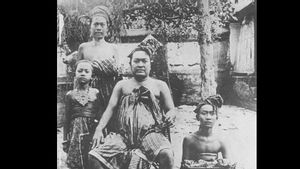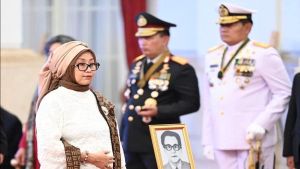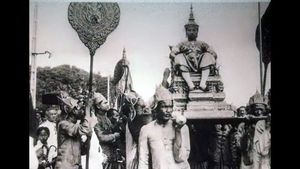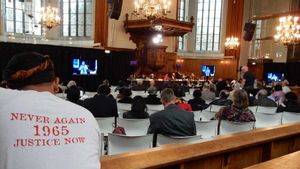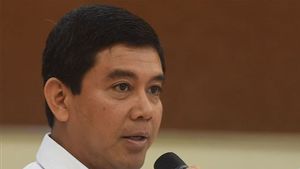JAKARTA - The decision of the Dutch trading airline, the VOC, monopolizes the spice trade is unanimous. Whoever rejects the Company's power will be fought. The narrative has a lot of fear. Moreover, the Company likes to conquer many local kingdoms.
In fact, this fact did not scare Bataha Santiago. The ruler of the Manganese Kingdom, which is located in Sangihe, chose his own path of arms. He and all his people chose to fight the Dutch. Even though his life was at stake. Colonizers must fight, not let them fight.
The Company has a variety of ways to monopolize the spice trade in the archipelago. From a subtle and rough way. A subtle way to prioritize negotiations. While the harsh way is war. The Company is never afraid of war options. Because they are equipped with an adequate war fleet like a country.
Andil made the monopoly power not need to squeeze a lot of sweat for the Company. The power of attorney only needs to determine the location. Invite cooperation. If you don't want to, then you will be fought. The repeated narrative continues to be perpetuated before the Company finds a more powerful strategy of divide at impera politics, division and master.
The study of war has been proven to make the Company win in Jayakarta a city that was changed by Compeni to Batavia in 1619. The same narrative also lasts in the Banda Islands in 1621. The victory and the superiority of the Company in the war put them above the wind.
Other areas were also looked at. North Sumatra, one of them. VOC is attracted by the results of the Manganitu Kingdom's cloves. The Company also intends to invite Bataha Santiago, who in fact leads the Manganese Catholic Christian Empire to work together.
Bataha Santiago is considered by the Dutch to have no need to bother planting, taking taxes, etc. Anyway, Bataha Santiago only accepts a percent of the Company for a monopoly. Bataha Santiago did not approve of the narrative.
The Company also includes the requirements so that only one religion develops in Sangihe, namely Protestants. This intention made Bataha Santiago take up arms in 1675.
The King of Bataha Santiago, after knowing the Kompeni's intention to attack the kingdom, did not remain silent. People who love him very much gather power with traditional weapons such as spears and swords complete with their shields. Those who are willing to fight are not only men but also women's troops. To lead all these troops, the King's younger brother named Diamanti acted as commander in chief.
"He was assisted by his younger brother named Gaghinggilhec and two younger sisters named Apueng and Sapela. These four war leaders are each named Babaning which means Panglima. Women's troops are led by the two women's materials above," wrote JP Tooy and friends in the book History of Resistance Against Imperialism and Colonialism in North Sulawesi (1984).
The Company was not afraid. The owner of power is ready to immediately gather troops from the area that has been conquered or cooperated with him. From Tahuna to Ternate. The leather troops immediately collaborated with the local natives.
The Dutch perpetuated fierce resistance. The first and second attacks were anticipated by the Bataha Santiago troops. However, the siege of the pockets of Manganese troops changed everything. The strength that was solid began to weaken.
The Dutch easily pushed back Manganitu troops. Moreover, incomparable weapons equipment further emphasized that the Dutch were able to come out victorious. At its peak, Bataha Santiago was arrested and detained by the Dutch.
The Netherlands does not want Bataha Santiago's influence to stick together. The only option to break the chain of resistance is to perpetuate the hanging sentence of Bataha Santiago. The execution was perpetuated in Tanjung Tahuna (now: Tanjung Santiago) in the same year, or in 1675.
It may have made the Dutch succeeded in conquering the Sangihe area. However, for the natives, the resistance effort made an impression. The Indonesian government also captured the courage of Bataha Santiago by giving him the title as a National Hero. The title was plenaryly given on November 10, 2023.
His successor is the King of Bataha Santiago (Don Siut Jugov) who ruled in 1670-1675, with the center of power of Bawohung Tiwo. In 1675, he was arrested and imprisoned, then hanged in Tanjung Tahuna, where his grave stood majestic because he did not want to submit to the Dutch government.
اقرأ أيضا:
"He is the only king of Sangihe who fought against the Dutch colonialists, so that his name and services are still remembered as one of the heroes. Therefore his name is used as the name of one of the ABRI units (INI-AD) in Manado, namely KOREM (Komando Regiment) 131 KODAM XIII Merdeka," wrote the book History of the North Sulawesi Region (1982).
Bataha Santiago was awarded the title of National Hero in a ceremony led by President Jokowi at the State Palace, Jakarta on November 10, 2023.
The English, Chinese, Japanese, Arabic, and French versions are automatically generated by the AI. So there may still be inaccuracies in translating, please always see Indonesian as our main language. (system supported by DigitalSiber.id)



